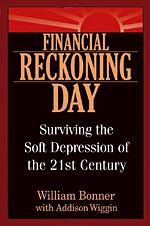Americans’ spending is slowing down. At least, that’s what the nation’s largest retailers say. Auto sellers, too, report a lack of interest in new wheels.
Why would the world’s best spenders lose interest?
They are running out of money, is our guess. Studies show clearly that consumer spending is tightly correlated with consumer income. Makes sense. When you don’t have any money, it’s hard to spend. But the studies also show that recently, incomes and spending have parted company. Americans have spent far more than they have earned. In July, for example, spending exceeded income by an 8-1 margin.
How can you spend more than you make? You can borrow. Or you can spend the money you get back in tax refunds. But neither borrowing nor cutting taxes (without also cutting government spending) provides much of a foundation for long-term, solid growth in consumer spending. Eventually, the lines — real income and real spending — have to come back together. Why not now?
What provides consumers with more real spending money are more real jobs.
We do not like to be the bearer of bad tidings, dear reader, but we do not expect much wage growth in America for, say, the next 50 years!
A study by Deloitte Research tells us that even Wall Street’s jobs can be done by foreigners. As many as 2.3 million jobs in banking and securities could be exported overseas, the study concludes.
Information technology, taxes, administration, human resources, benefit management — many of the “service” jobs that fill up Dilbert cartoons — could also be done in Calcutta or Bombay.
And, of course, manufacturing. Even America’s homebuilding industry could be challenged — by factory-made modular units produced overseas and brought here on cargo ships.
Incidentally, ships are arriving from Asia at Southern California ports in record numbers. Also in record numbers are they returning whence they came — empty, deadhead. We import; we do not export. We consume; we do not produce. Gadgets and geegaws are coming in; money is going out. We sail towards our own destruction, not to glory.
Competition for jobs by strangers in strange places probably means deflation in wage rates worldwide. Since the pool of labor in the Far East is almost infinite…and since the gap between Western compensation levels and those in Asia is so wide…and since the technological advances that make globalization pay keep coming…we can expect the trend in declining labor costs to last for decades.
 Deflation, dear reader. Deflation.
Deflation, dear reader. Deflation.
The golden age of the West is dying. People in Houston can no longer expect to earn 10 times more than people in Haiphong. Now, they will have to compete with the rest of the world…and bid for the world’s energy…its gadgets and geegaws…its Monets and Modiglianis…and even its food…in a market crowded with rich foreigners.
The old order has to pass away. It can die easy. Or it can die hard. That is the story we will watch for the next half a century.
Bill Bonner [send him mail] is the author, with Addison Wiggin, of Financial Reckoning Day: Surviving the Soft Depression of The 21st Century.



